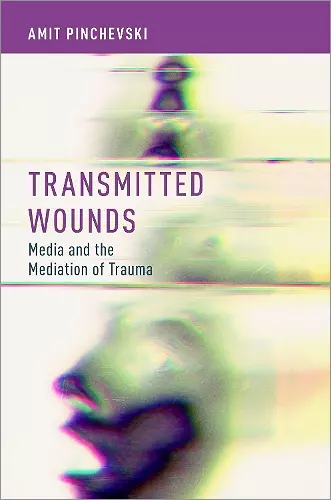Transmitted Wounds
Media and the Mediation of Trauma
Format:Hardback
Publisher:Oxford University Press Inc
Published:7th Feb '19
Currently unavailable, and unfortunately no date known when it will be back
This hardback is available in another edition too:
- Paperback£24.99(9780197600795)

In Transmitted Wounds, Amit Pinchevski explores the ways media technology and logic shape the social life of trauma both clinically and culturally. Bringing media theory to bear on trauma theory, Pinchevski reveals the technical operations that inform the conception and experience of traumatic impact and memory. He offers a bold thesis about the deep association of media and trauma: media bear witness to the human failure to bear witness, making the traumatic technologically transmissible and reproducible. Taking up a number of case studies--the radio broadcasts of the Eichmann trial; the videotaping of Holocaust testimonies; recent psychiatric debates about trauma through media following the 9/11 attacks; current controversy surrounding drone operators' post-trauma; and digital platforms of algorithmic-holographic witnessing and virtual reality exposure therapy for PTSD--Pinchevski demonstrates how the technological mediation of trauma feeds into the traumatic condition itself. The result is a novel understanding of media as constituting the material conditions for trauma to appear as something that cannot be fully approached and yet somehow must be. While drawing on contemporary materialist media theory, especially the work of Friedrich Kittler and his followers, Pinchevski goes beyond the anti-humanistic tendency characterizing the materialist approach, discovering media as bearing out the human vulnerability epitomized in trauma, and finding therein a basis for moral concern in the face of violence and atrocity. Transmitted Wounds unfolds the ethical and political stakes involved in the technological transmission of mental wounds across clinical, literary, and cultural contexts.
a very interesting read * Angelika Laumer, Review Journal for the Study of Culture *
Given Pinchevski's interest in the nondiscursive aspects of trauma and the various relationships among minds, technologies, and bodies, Transmitted Wounds begs to be put in conversation with affect theory...Pinchevski works to understand how media may capture these struggles and mediate the unmediated. Therefore, grounding Transmitted Wounds in affect scholarship would help illuminate the real that Pinchevski takes as his starting point. * Chiaoning Su, International Journal of Communication *
Transmitted Wounds constitutes a significant contribution to the scholarship on the role of media in the transmission and working through of traumatic experiences. Pinchevski, on the communication and journalism faculty at Hebrew University in Israel, discusses five case studies....This is an important book for anyone interested in the relationships among media, trauma, and historical memory. * K. Sorensen, Bentley University, CHOICE *
This book delves into the combustible mixture of mind and media. Amit Pinchevski follows the hint in recent media theory that media are not just cultural artifacts to be interpreted but fundamental infrastructures that constitute and provide access to whatever it is we think of as mind. His media formulation of trauma as the mediation of failed mediation may well become, once its full resonances are absorbed, field-defining. The book is a fascinating study for thoroughly tying together media and trauma, but it achieves much more by asking key moral questions about the meaning of immediacy, presence, and telepresence in the face of some of the major catastrophes of our time. * John Durham Peters, Maria Rosa Menocal Professor of English and of Film & Media Studies, Yale University *
This thought-provoking book gives us new ways to understand the mediation of trauma and collective memory and the relationship between technology and human suffering. Eloquent and wise, Pinchevskis book raises urgent moral and political questions we all need to keep asking. * Katie Trumpener, Emily Sanford Professor of Comparative Literature and English, Yale University *
A highly original intervention into trauma theory. Pinchevksi's deft and erudite analyses shine a light on how the digital is shaping memories of traumatic pasts in new ways. Tackling an exciting range of material from videography and testimony to the uses of virtual reality for therapy, this is an outstanding research book which every student of memory should read. * Anna Reading, Professor of Culture and Creative Industries, King's College, University of London, and Western Sydney University, Australia, and author of Gender and Memory in the Globital Age *
ISBN: 9780190625580
Dimensions: 140mm x 213mm x 23mm
Weight: 318g
200 pages